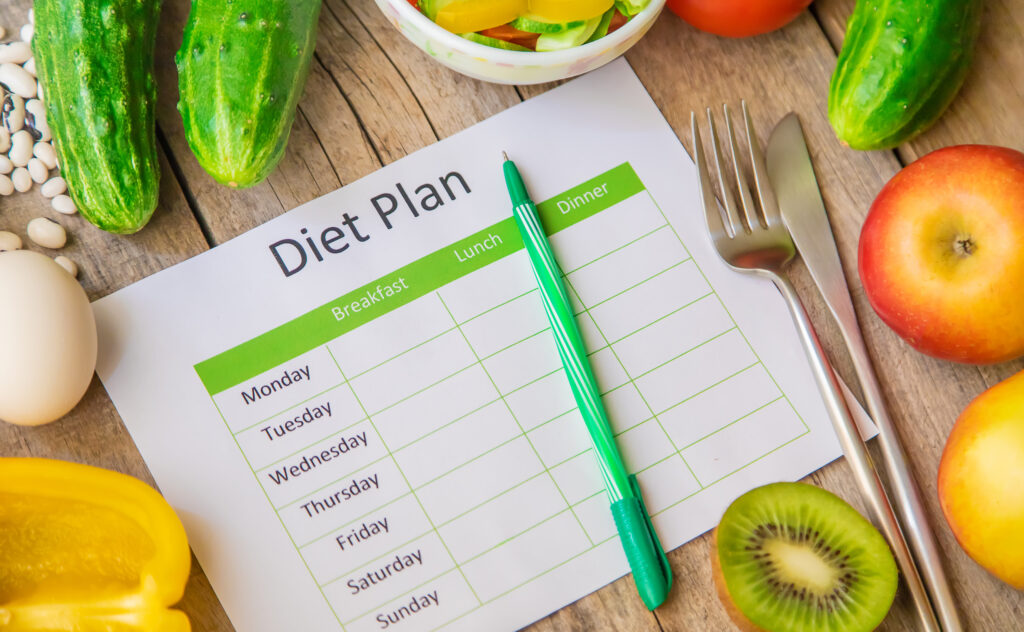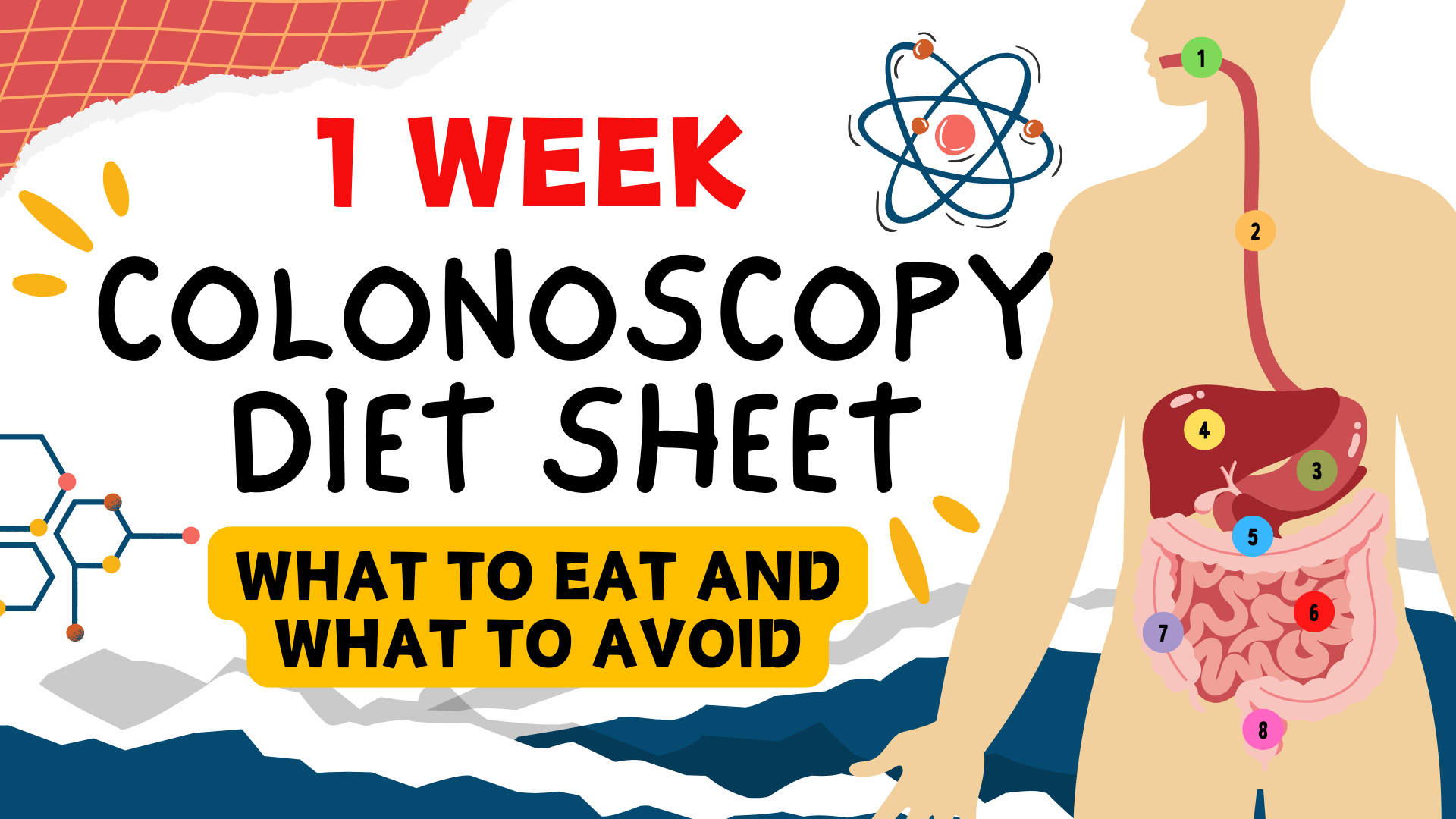What is Colonoscopy ?
The colonoscopy allows the doctor to inspect your inner colon and rectum. 1 Week Colonoscopy diet sheet is an important part of prevention for conditions such as colorectal polyps and inflammation. Preparation is one of the key factors to a successful procedure.
A strict diet is essential for a successful colonoscopy, particularly in the weeks leading up to it. It is important that the colon be as clean as you can for your doctor to see clearly.
This blog will explain what foods you should eat, and which ones to avoid, as per the diet sheet for a 1-week colonoscopy.
In addition to my personal experiences, I will also share observations and insights I have gained from working with patients. I hope that this blog post provides you with clear advice and practical tips on how to get ready for your colonoscopy.
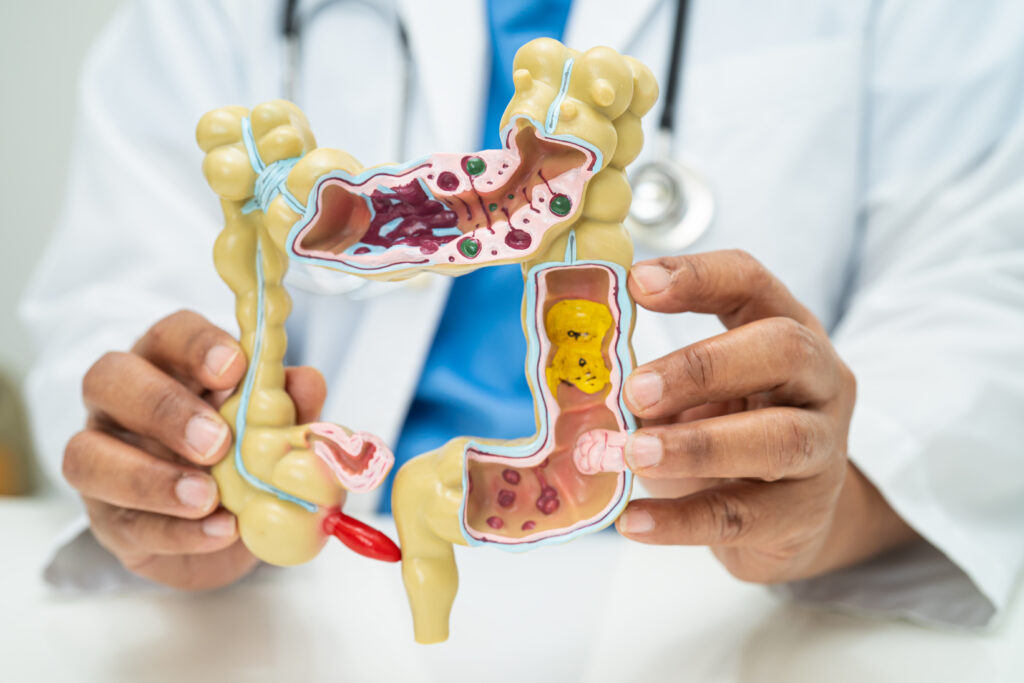
What to Eat Before Colonoscopy?
A colonoscopy’s purpose is to examine the colon. Therefore, a clear and clean colon is necessary. The lining of your colon can be seen better with a clearer colon.
This allows you to detect any abnormalities. You can achieve this by limiting fibers, avoiding certain foods which may leave residues, and following a liquid diet close to the procedure.
Reduce the waste that is in your digestive tract. This means avoiding high-fiber food like seeds, whole grains and raw vegetables that can cause particles to accumulate in your colon.
A clear liquid diet is also recommended (1-3 days prior to the procedure). This helps move things through the colon and keeps it clean.
Colonoscopy Diet Sheet for 1 Week
Let’s now break your diet down into phases that you can manage in the weeks leading up to your colonoscopy.
How to Eat 7 days before the Colonoscopy
You can continue to eat normal food in the beginning, but should begin to eliminate foods high in fiber. In this stage, you will be reducing the amount of residue that is in your digestive tract.
What to Eat?
- Proteins that are low in fat: Eggs, chicken, turkey, salmon, tofu, and fish.
- Vegetables with low fiber: Carrots, potatoes, squash and other vegetables can be eaten well cooked or in a canned form. Raw vegetables are very high in fibre.
- It is easier to digest white bread and pasta than whole grain options.
- The fiber content of white rice and crackers is also lower than that of whole grain counterparts.
- Milk, yogurt and cheese are all relatively easily digestible dairy products.
What to avoid:
- Vegetables high in fiber: Corn, broccoli, raw vegetables and peas can all leave residue.
- Avoid whole grains such as brown rice, quinoa and oats.
- Nuts, seeds and other foods can cause a lot of debris and be hard to digest.
- Legumes: Legumes, beans, lentils and other legumes contain too much fiber to be consumed in the first stages of the diet.
You can achieve a healthier colon by concentrating on foods that are easy to digest and avoiding those high in fiber. This is the key part of my advice to patients. It will help them get through their next step with less complications.
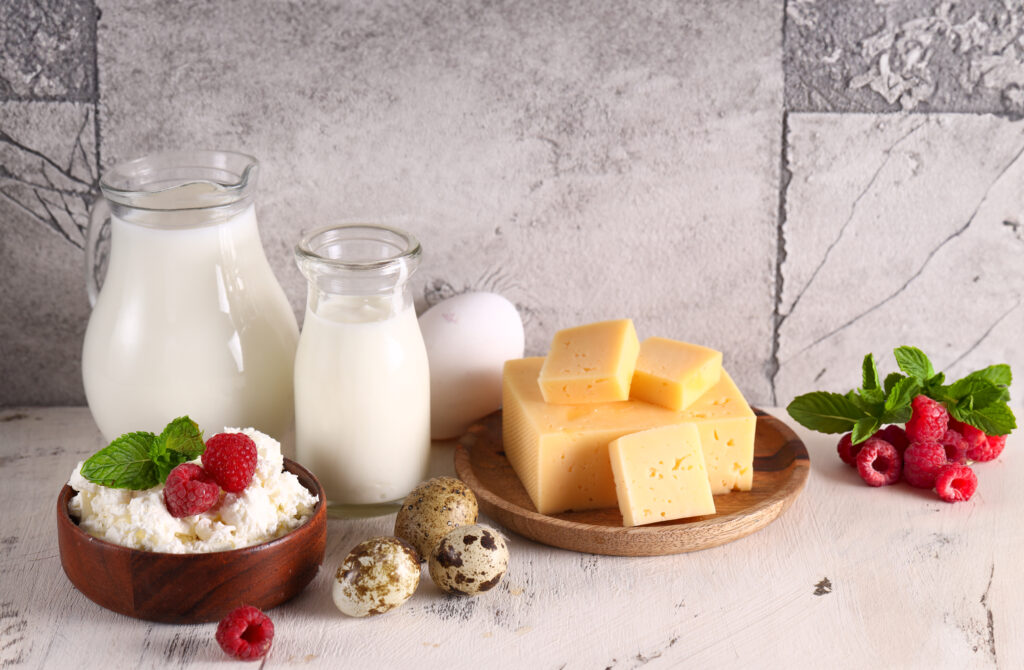
4-5 days before the colonoscopy: Start the transition
Your digestive system will start to adjust at this stage. Continue to reduce high fiber foods, and start incorporating foods that are more easily digestible. You will start to depend more on liquids than solids.
What to Eat?
- Toast or white bread with butter and jam.
- Eggs boiled or scrambled (without peel or skin).
- At this point, clear broths are great: chicken or beef broth.
- Avoid citrus juices and pulp. Apple, white grape or cranberry are all good alternatives.
- Yogurt low in fat: It will keep you healthy, and provide nutrition.
What to avoid:
- Foods high in fiber, such as leafy vegetables, legumes and beans.
- Fruits like apples and berries that have skins or seeds.
- White pasta or white bread is the best choice for whole grains.
You’re probably starting to notice the change in your diet. It’s normal to be a bit uncomfortable about this change. But it is necessary for an accurate colonoscopy.
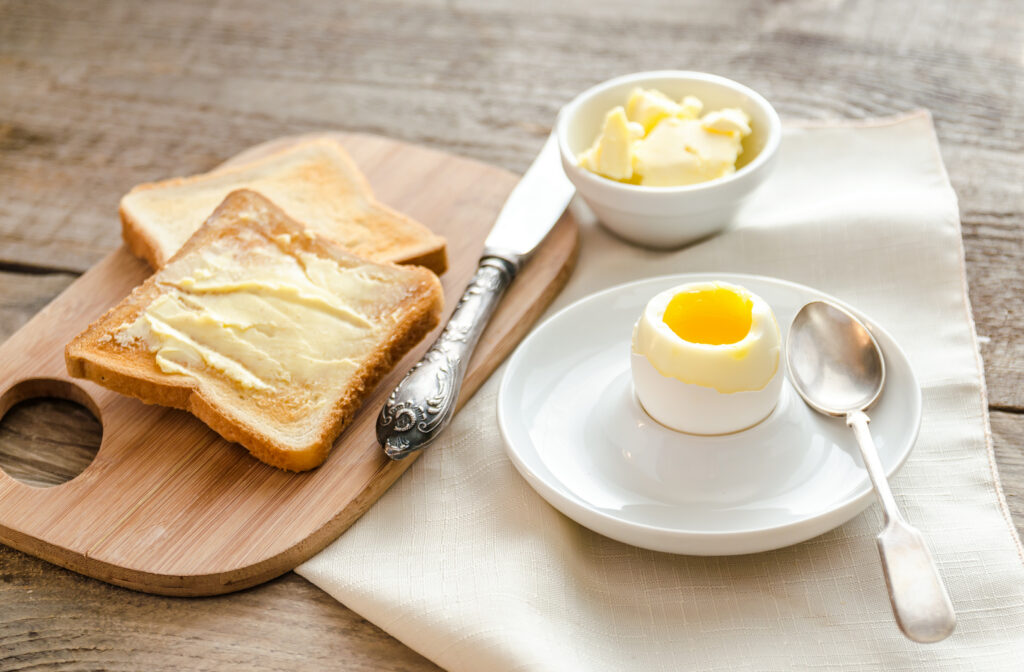
Eat Clear Liquid Diet 2-3 days before the Colonoscopy
You’ll have to switch to a liquid diet in the days before the procedure. You will need to do this in order for your colon to be completely cleared before the procedure. This is also when you will start feeling hungrier and more tired, since your caloric intake will have been drastically reduced.
What to Eat?
- Broths clear: Beef, chicken, and vegetable broths all work well.
- Apple juice, grape white juice and other juices with no pulp.
- Coffee and tea: plain coffee or tea without cream or milk. This can help some people feel more energetic.
- They can also help to maintain electrolyte balance.
- Simple gelatin without fruit or dyes can make a tasty snack.
What to avoid:
- Any drinks or orange juice with pulp is prohibited.
- Now, the diet is purely liquid.
It’s important to transition my patients from a solid diet to clear liquids. I know that this can be a difficult process, but it is necessary. They find solace in knowing that the phase will be short and they’ll reap the rewards of a colonoscopy.
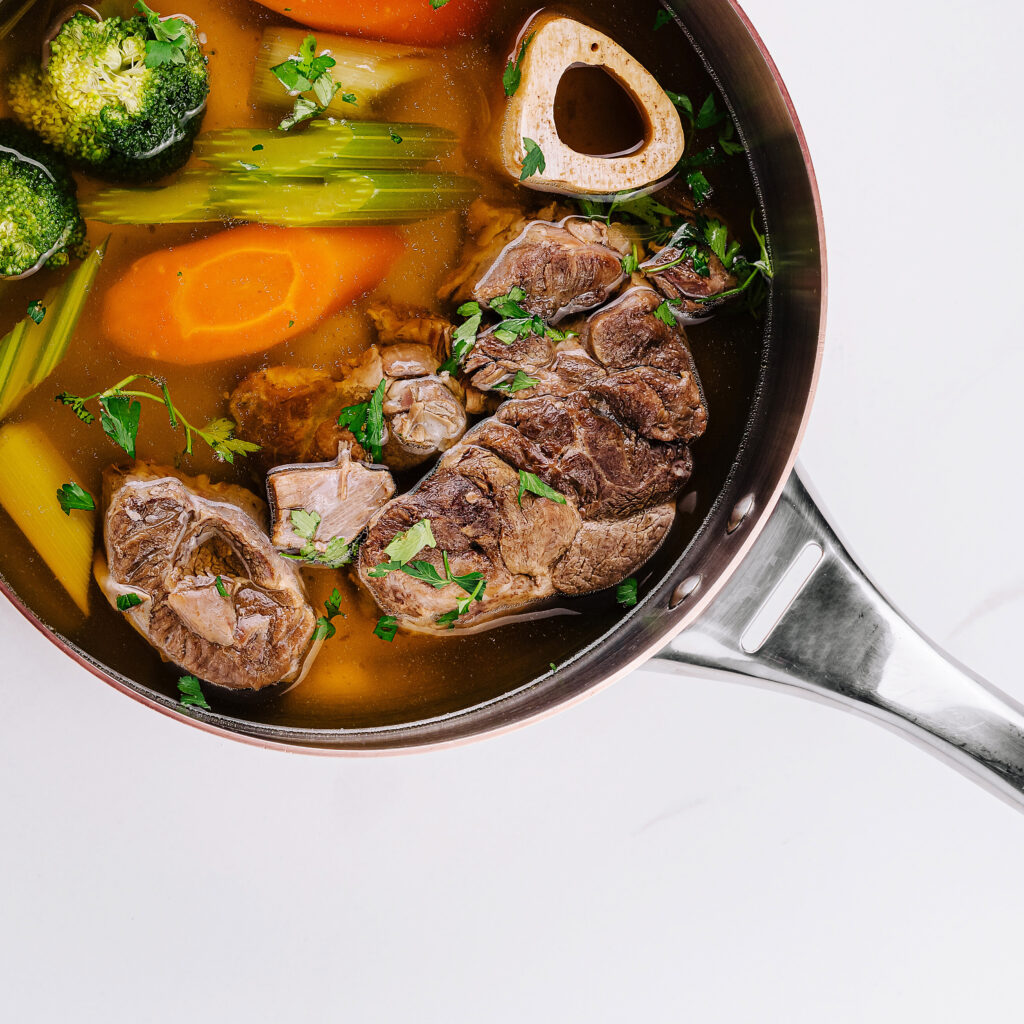
You should fast the day before your colonoscopy.
You will probably be told to completely fast the day before you have your colonoscopy. After a specific time (usually midnight), you will be instructed to refrain from eating solid food and drinking liquids. It is important to make sure that your stomach is empty of food and liquids before the procedure.
- Drink clear liquids up to 2-4 hours before your appointment. Water, juices or broth are all acceptable.
- It’s important that there are no solids in your colon as you approach the colonoscopy.
I recommend that patients avoid all distractions and stay at home during this stage. Focus on staying hydrated, and getting ready for your laxative to clean out the colon.
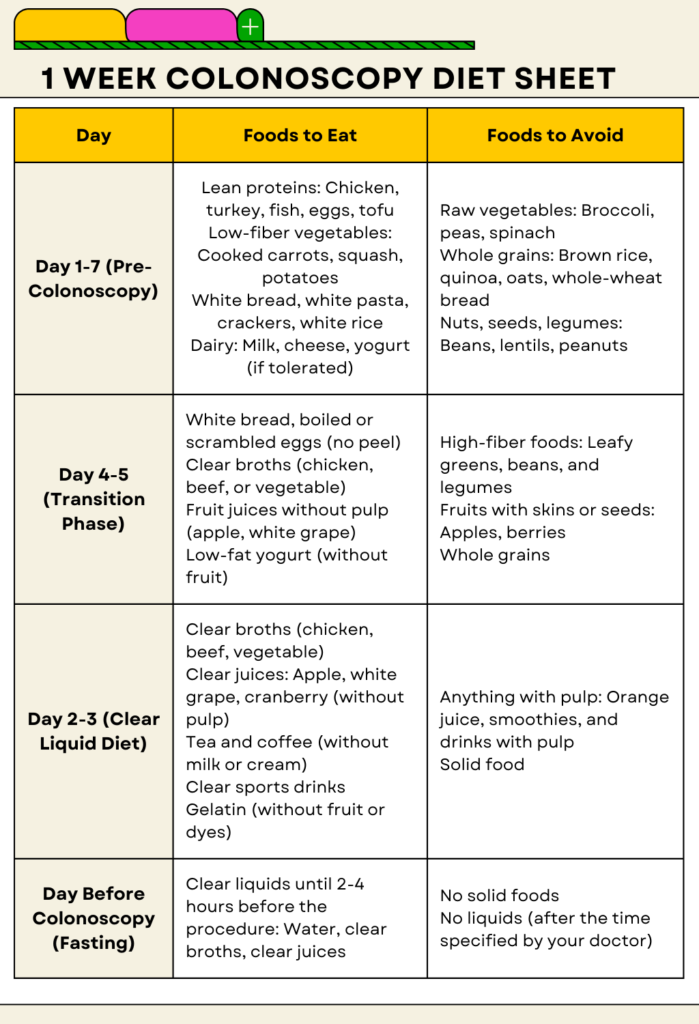
The final preparation and use of laxatives
You will be prescribed a laxative the day prior to your colonoscopy. It will cause diarrhea, which helps to clear out the colon. You will be given specific instructions by your doctor, but you should take it in two doses: the first the night before the colonoscopy and the second the day of.
Follow the directions carefully. Although it may feel uncomfortable, you must completely clear your colon.
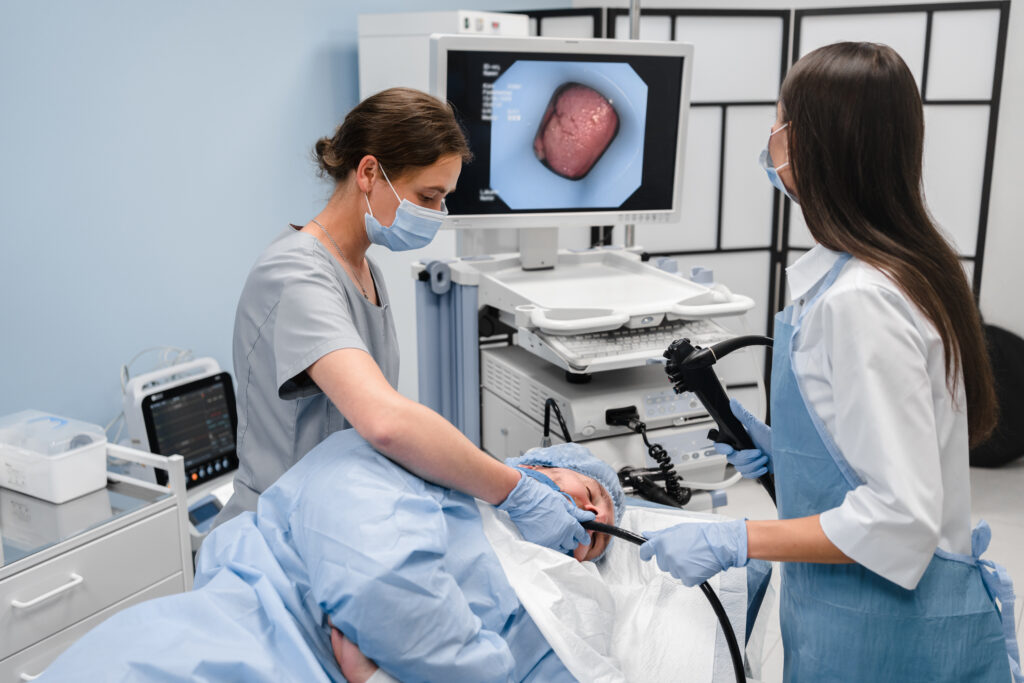
Colonoscopy preparation: My personal take
In my role as a health professional, I have had the pleasure of helping many patients prepare for colonoscopy. It’s important to follow the instructions for diet. My own experiences and those of patients have convinced me that your efforts will pay off. If you skip any of the parts or do not follow it precisely, this can result in a colonoscopy that is less thorough and may need to be repeated.
Personal experience has shown me how smoother a procedure is when the patient follows the diet. I have also seen how people who do not take their preparation seriously end up feeling frustrated. Not to mention, the additional time and cost involved in rescheduling the procedure.
The Value of This Process
While it might seem like a lot of work, I tell my patients the advantages far outweigh any inconvenience. It is only a quick procedure but can be life-saving by finding early signs of cancer. I believe that following the diet for a week is worth it if you want to be free of worry and receive preventive health care.
MOST SEARCHED TOPICS
General Overview of Colonoscopy Preparation
- The purpose of the Colonoscopy Colonoscopy is a procedure in medicine that allows you to look at the large intestine (colon) to detect abnormalities like polyps, cancer, or inflammation. Preparing for a colonoscopy is vital to ensure that the colon is free of food particles, waste, or debris.
- The importance of diet Food choices as well as avoiding other foods aids in the process of preparation. Clearer colons allow for more visibility during the test and provide more accurate outcomes.
The 1-Week Colonoscopy Diet Timeline
- Days 7-4 before the Protocol The first couple of days of your diet usually permit regular meals, but there are some limitations (e.g., the restriction of the intake of fiber and staying away from seeds, nuts as well as whole grains). This week, you should focus on getting the digestive system to an edgy diet.
- Days 3-2 Prior to the procedure When the procedure day approaches, you’ll require a more controlled diet. This can mean strictly low-fiber meals in which fruits, veggies, as well as whole grains are discarded.
- The day before The Colonoscopy (Clear Liquid Diet) The day prior to your Colonoscopy, you’ll be advised to adhere to the clear liquid diet and complete emptying the colon. Clear broths are included and transparent juices (without pulp) and certain drinks like sports drinks and water with no added color.
Foods to Eat in the Days Leading Up to the Procedure
- Low-Residue and Low-Fiber Foods The main goal is to reduce the amount of non-digested food within the colon. Foods that are recommended include:
- White rice, white bread, and pasta (refined grains)
- Canned, cooked, or cooked vegetables with no skin
- Eggs, chicken, or seafood (without any spices or even heavy fats)
- Dairy (if tolerated) like yogurt or milk
- Clear soups and broths that are clear, fruit juices (apple or white grape), and sports drinks that are transparent and free of artificial coloring agents.
- Hydration Hydration: Being hydrated is crucial during the whole process of preparing your diet and especially during the time before your Colonoscopy. Consuming lots of fluids can assist in cleansing your system.
Foods to Avoid During Colonoscopy Preparation
- High-Fiber Foods Do not eat foods high in fiber that may leave a residue behind in the colon. Examples include as
- Whole grain (brown rice whole wheat bread)
- Raw vegetables and fruits (particularly ones with skins and seeds)
- Legumes (beans, lentils)
- Popcorn, nuts and seeds
- Fat, Fried, and Spicy Foods may irritate your digestion and cause it to be more difficult to cleanse your colon completely.
- Colored drinks: Avoid beverages with artificial colors (like purple, red, or orange) as they may cause colon staining and hinder medical professionals from interpreting the result.
The Role of Clear Liquids and Supplements
- Clear Liquid Diet Prior to the Colonoscopy, it is essential to adhere to a clear, liquid diet. This includes:
- Clear broths (beef, chicken, beef, or other vegetables)
- Coffee or tea without milk, cream or cream
- Pure fruit juices (without pulp)
- Gelatin (without the coloring of purple or red)
- Drinks for sports without coloring
- Water
- Electrolyte Balance: A few people may be advised to consume an oral electrolyte drink or rehydration solution in order to keep their hydration level up and to prevent imbalances in electrolytes during the cleansing.
- Enemas or Laxatives: A healthcare practitioner might recommend or prescribe a stool preparation medication (like polyethylene glycol or sodium phosphate) to aid in cleaning your colon. You must be sure to follow these directions with care.
Common Mistakes to Avoid During Colonoscopy Preparation
- Incorrectly following the Clear Liquid diet properly The liquid clear diet is vital on the day prior to the procedure. If you eat anything that has pulp or color that contains color, it could lead to an unprepared diet and impact the outcome of your Colonoscopy.
- Lack of Hydration It’s simple to forget about drinking sufficient fluids throughout the process of preparation, particularly when you are using laxatives. Insufficient hydration may cause discomfort and possibly affect the process.
- Consuming foods that leave residue In the early stages, it’s crucial to limit your intake of low-fiber food items. Any food that has a significant amount of residuals can affect the cleanliness of the colon and the efficiency of the process.
- Inadequately following instructions for Laxative Usage The laxative that your physician prescribes must be strictly adhered to with regard to the dosage and timing as well as any other specific directions.
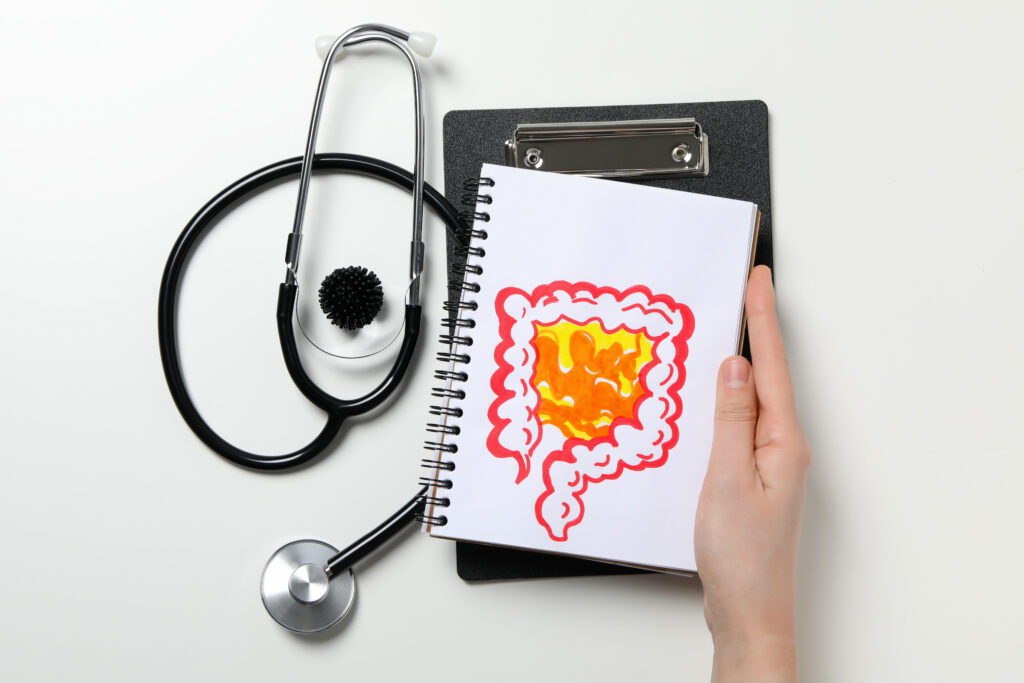
Conclusion: Colonoscopy Diet Matters
The 1-week diet for colonoscopy is intended to clean your colon and prepare it for the procedure. You can achieve the best results by starting off with low-fiber food, then moving on to liquids, and finally following your doctor’s laxative recommendations. The key is to take the preparation seriously. You don’t just have to avoid certain foods, but prepare your body so that you get the best results from the colonoscopy.
The diet is important for your health and the outcome of the surgery. Stay hydrated and concentrate on long-term results. Following this plan is what I would recommend to you. I’ve seen many patients successfully go through the process.
FAQs
1. Why diet is essential before a colonoscopy?
A healthy diet is important because it allows your doctor to see clearly during surgery. Clean colons allow for better diagnosis of issues.
2. What should I be eating 7 days prior to my colonoscopy?
Avoid high-fiber foods like whole grains, seeds, vegetables with low fiber, and white bread. High-fiber food like seeds, grains and whole grains should be avoided.
3. What fruits can I eat before my colonoscopy procedure?
You can eat some fruits, like bananas or apples that have been peeled, but you should avoid any with skins or seeds. Avoid fruits with high fiber contents.
4. What is the best time to start the liquid clear diet?
Start the clear liquid diet 2-3 days prior to your colonoscopy. Clear broths, teas or coffees with no cream, and juices without pulp are all part of the diet.
5. What should I not consume during the phase of clear liquid diet?
Stick to clear liquids only. Avoid dairy products, solid food, or anything that contains pulp such as smoothies, orange juice, or other drinks. Only drink clear liquids.
6. What is the recommended time to fast prior to a colonoscopy procedure?
Fasting is recommended from midnight on the day before your procedure. You can drink clear liquids up to 2-4 hours prior to your colonoscopy.
7. What can I do the day before my colonoscopy to prepare?
You can indeed drink water. However, avoid any other liquids once your doctor has recommended a cutoff, which is usually 2-4 hours prior to the procedure.
8. What is the purpose of laxatives during colonoscopy preparation?
By causing diarrhea, laxatives cleanse the colon and ensure there are no waste products left in your digestive system prior to the procedure.
9. Does it matter if I feel hungry on the liquid clear diet?
You can still eat when on the liquid-clear diet. However, this is a short phase and is designed to help prepare you for your colonoscopy.
10. If I do not follow my diet correctly, what happens?
A less complete colonoscopy can be caused by not following the recommended diet. This could require a second procedure. To get accurate results, it’s crucial to adhere to the diet guidelines.
